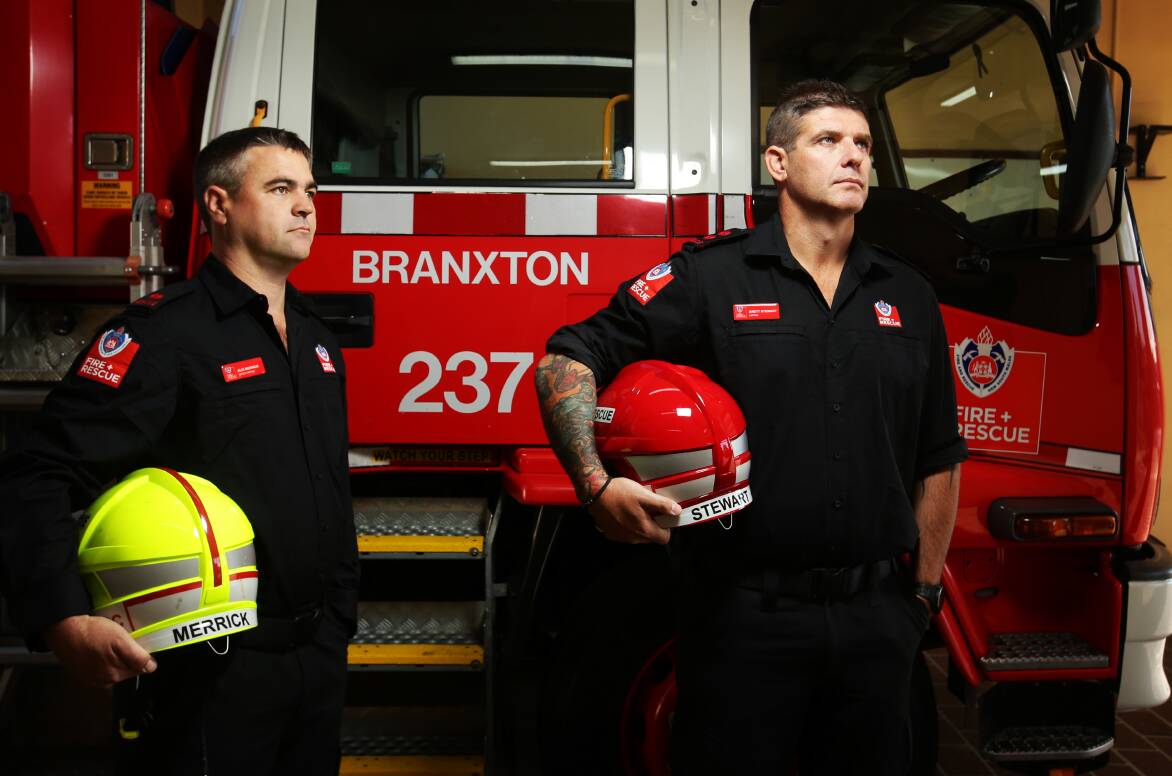
Firefighters at the scene of the horrific bus crash at Greta said it was the toughest job of their lives, but they're proud of the "brilliant efforts" of the emergency services.
The aftermath of the crash, which took 10 lives and left multiple passengers injured, has been compared to a battlefield.
Senior officers spoke to the Newcastle Herald about their mindset during the incident and how they process the trauma.
Deputy Captain Alix Merrick and his crew - of Branxton Fire and Rescue NSW - were the first firefighters at the scene of the crash, which happened at 11.35pm on Sunday.
"Arriving with a bus on its side with that amount of people inside is more than confronting," Deputy Captain Merrick said.
He said the firefighters had trained for various crash scenarios involving buses and cars.
"We had a single bus on its side with multiple casualties that were assisting each other to get out of the bus," he said.
These people were "the ones who could walk - the walking wounded".
The firefighters were quickly tasked to help a person trapped under the bus.
"This involved us lifting the bus up with some of our rescue equipment - high pressure airbags - to remove that patient," Deputy Captain Merrick said.
His crew of four played a major role in freeing the person, along with ambulance officers.
On the morning after the crash, Branxton Fire and Rescue Captain Brett Stewart was involved with "the recovery and uprighting of the bus".
His crew was tasked with helping a police rescue team lift the bus and "remove the last of the passengers".
"It was very confronting. It was a tough day. It was something that I'd prefer to never have to do again," Captain Stewart said.
But while he was in the moment, he focused on the job at hand.
"The mindset is we've been asked to do a job and I'm going there to do it the best I can," he said.
"With the training and experience we have, we can generally stay pretty well aligned with our plan."
Captain Stewart said the firefighters train regularly for motor vehicle accidents and complex rescues.
"As a primary rescue station, we do focus a lot on things like that," he said.
"It's one of those things you train for, but don't ever want to do. When it does happen, we are prepared for it."
Newcastle-Lake Macquarie Fire and Rescue NSW Superintendent Brian Smart arrived at the scene of the crash at about 1am.
"The rescue and response had been underway for about an hour or so," Superintendent Smart said.
"It was a horrific scene, as bad as anything I've come across in 38 years in fire and rescue.
"You click into response mode and follow the procedures and plans you've been trained for."
As he joined the leadership command and coordinated operations with other agencies, the rescue was coming towards its end.
"The focus was then on the welfare of your people and the ongoing recovery because you know it's going to be a protracted incident," he said.
The PTSD [post-traumatic stress disorder] risk that emergency services personnel face from the incident was managed quickly.
"We have a lot of procedures and arrangements in place to try to ensure the wellbeing of our people," Superintendent Smart said.
"Particularly on the night, that involved having a peer support person to debrief the firefighters as they left the incident. They had a very experienced peer whose role was to tell them about the services available, to make sure they're OK and do the best they can.
"All you can do is give the opportunity to people to utilise those services. Everyone is different with their coping mechanisms."
He said Fire and Rescue NSW "make available a lot of services to try to prevent psychological injury".
Deputy Captain Merrick said "we do a lot of debriefing and have access to plenty of mental health assistance".
"We have chaplains, EAP [employee assistance program] teams that assist us with the debriefing side, talking about the incident later.
"I personally try to keep my job separate from my family life," he said, but added "it is still part of it afterwards".
Captain Stewart said "the services offered to us are really helpful".
"A lot of people do use those," he said.
"I debrief with the crew, but also do a lot of talking with my wife. She's a really good support service for me.
"She helps me through a lot of jobs we get."
Superintendent Smart said he was "immensely proud of the efforts of Fire and Rescue personnel on scene on the night".
"They worked brilliantly," he said.
"I'd also acknowledge the incredible work done by the partner agencies, particularly ambulance, police and the Rural Fire Service," he said.
"The coordination of the services and the commitment to the task of helping people was just outstanding.
"I've never seen an incident work so well."
Captain Stewart said he had "so much respect for all the services".
"Everyone did their job exactly how they were supposed to do it.
"My crew worked really well together. I'm really happy and proud of how they conducted themselves."
Deputy Captain Merrick said the emergency services "worked well as a team".
"Regardless of what shirt we wear, we're all trained to do a job. We all did that professionally."

.png?w=600)





